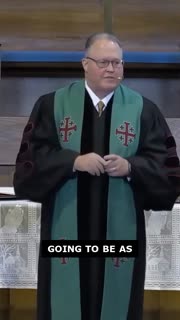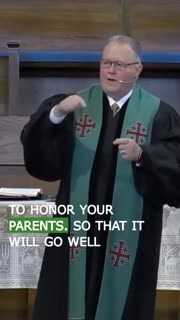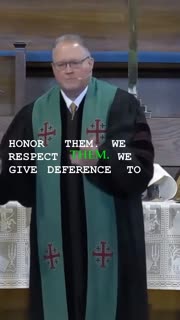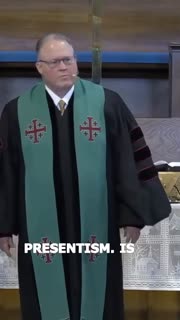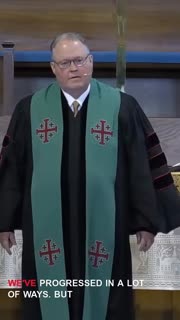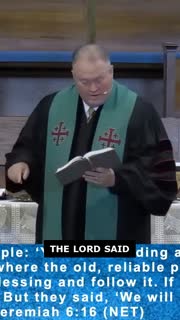Honoring Parents: A Pathway to Life and Blessing
Summary
### Summary
Good morning, Summit Heights! Today, we continue our Life Preservers series, focusing on the Ten Commandments as pathways to life rather than mere rules. These commandments serve as guardrails to keep us on the path God has designed for us. The first four commandments focus on our relationship with God, while the remaining six address our relationships with others. Today, we transition to the fifth commandment, which emphasizes honoring our parents.
Honoring our parents means giving them weight and reverence, recognizing their wisdom and experience. For young people, this means understanding that parents often know more than they think. For adults, it involves caring for aging parents, especially in a world without social safety nets. This commandment also carries a promise: honoring your parents leads to a long life in the land God has given you. This promise is tied to covenant faithfulness, reminding us of God's deliverance and blessings.
Honoring our parents goes beyond mere obedience; it involves maintaining the faith handed down to us. This commandment presupposes believing parents, but even if our parents are not believers, we still owe them respect for giving us life. In our current culture, we often suffer from "presentism," a narcissistic belief that nothing worthwhile happened before our generation. This mindset leads to a breakdown in family and societal values.
Technological progress has not necessarily led to human progress. Despite advancements, we face a mental health crisis, family breakdowns, and a move away from God. God calls us back to the old, reliable paths that lead to blessing and rest for our souls. Jesus invites us to come to Him for rest, peace, and wholeness. Tragically, many reject this invitation, but God continues to hold out life and joy for us. Let us say yes to God's way, the way that leads to life.
### Key Takeaways
1. Honoring Parents as a Lifelong Commitment: Honoring our parents is not just for children but extends into adulthood. It involves recognizing their wisdom and caring for them as they age. This commandment carries a promise of a long life, tied to covenant faithfulness and God's blessings. [04:28]
2. The Deeper Meaning of Honor: Honoring our parents means more than obedience; it involves maintaining the faith they handed down to us. This commandment presupposes believing parents, but even if they are not, we still owe them respect for giving us life. This respect acknowledges God's role in our creation. [12:25]
3. Presentism and Its Dangers: Our culture often suffers from "presentism," a belief that nothing worthwhile happened before our generation. This mindset leads to a breakdown in family and societal values, ignoring the wisdom and experiences of those who came before us. We must honor the past to build a better future. [13:14]
4. Technological Progress vs. Human Progress: While technology has advanced significantly, human relationships and societal values have not necessarily progressed. We face a mental health crisis, family breakdowns, and a move away from God. True progress involves returning to God's ways and valuing human relationships. [16:49]
5. God's Invitation to Rest and Wholeness: God calls us back to the old, reliable paths that lead to blessing and rest for our souls. Jesus invites us to come to Him for rest, peace, and wholeness. Despite the world's rejection, God continues to hold out life and joy for us. Let us say yes to God's way, the way that leads to life. [19:34]
### YouTube Chapters
[0:00] - Welcome
[03:01] - Transition in the Ten Commandments
[04:28] - Honoring Parents: What It Means
[05:26] - Wisdom of Parents
[06:07] - Caring for Aging Parents
[07:01] - Parenting Crisis in Modern Times
[08:02] - Adult Relationships with Parents
[09:05] - The Promise Attached to Honoring Parents
[10:30] - Covenant Faithfulness and Blessings
[11:07] - Remembering God's Deliverance
[12:25] - Honoring Believing and Non-Believing Parents
[13:14] - Presentism and Its Impact
[14:19] - The Myth of Progress
[16:49] - Technological vs. Human Progress
[18:56] - God's Call to Return
[19:34] - Jesus' Invitation to Rest
[21:26] - Saying Yes to God's Way
[22:28] - Closing Prayer
Study Guide
### Bible Study Discussion Guide
#### Bible Reading
1. Exodus 20:12 - "Honor your father and your mother, so that you may live long in the land the Lord your God is giving you."
2. Deuteronomy 5:16 - "Honor your father and your mother, as the Lord your God has commanded you, so that you may live long and that it may go well with you in the land the Lord your God is giving you."
3. Matthew 22:37-39 - "Jesus replied: 'Love the Lord your God with all your heart and with all your soul and with all your mind.' This is the first and greatest commandment. And the second is like it: 'Love your neighbor as yourself.'"
#### Observation Questions
1. What does it mean to "honor" your parents according to Exodus 20:12 and Deuteronomy 5:16?
2. How does Jesus summarize the Ten Commandments in Matthew 22:37-39?
3. What promise is attached to the commandment to honor your parents? [10:30]
4. How does the sermon describe the cultural issue of "presentism"? [13:14]
#### Interpretation Questions
1. Why is honoring our parents considered a lifelong commitment, and how does it extend into adulthood? [06:07]
2. How does the concept of honoring parents go beyond mere obedience to include maintaining the faith handed down to us? [12:25]
3. In what ways does the sermon suggest that technological progress has not led to human progress? [16:49]
4. How does the sermon connect the promise of a long life in the land to covenant faithfulness and God's blessings? [10:30]
#### Application Questions
1. Reflect on your current relationship with your parents. How can you show them honor and respect in a tangible way this week? [04:28]
2. If your parents are aging, what specific steps can you take to care for them and honor them in their later years? [06:07]
3. How can you combat the mindset of "presentism" in your own life and community? What are some practical ways to honor the wisdom and experiences of previous generations? [13:14]
4. In what ways can you return to "God's ways" in your daily life, especially in your relationships with others? [18:17]
5. Jesus invites us to come to Him for rest and wholeness. What specific burdens or anxieties can you bring to Jesus this week, and how can you seek His rest? [19:34]
6. Think about the faith that has been handed down to you. How can you actively maintain and pass on this faith to the next generation? [12:25]
7. How can you ensure that your technological use enhances rather than detracts from your human relationships and spiritual life? [16:49]
Devotional
Day 1: Honoring Parents as a Lifelong Commitment
Honoring our parents is a lifelong commitment that extends beyond childhood. It involves recognizing their wisdom and caring for them as they age. This commandment carries a promise of a long life, tied to covenant faithfulness and God's blessings. In a world where social safety nets are often lacking, honoring our parents means providing for them and ensuring their well-being. This act of honor is not just about obedience but about valuing the life and experience they have given us. [04:28]
Ephesians 6:2-3 (ESV): "Honor your father and mother" (this is the first commandment with a promise), "that it may go well with you and that you may live long in the land."
Reflection: Think about a specific way you can honor your parents today, whether through a phone call, a visit, or helping them with a task. How can you show them that you value their wisdom and experience?
Day 2: The Deeper Meaning of Honor
Honoring our parents goes beyond mere obedience; it involves maintaining the faith they handed down to us. This commandment presupposes believing parents, but even if they are not, we still owe them respect for giving us life. This respect acknowledges God's role in our creation and the life lessons our parents have imparted to us. In honoring them, we also honor God, who placed them in our lives. [12:25]
Proverbs 23:22 (ESV): "Listen to your father who gave you life, and do not despise your mother when she is old."
Reflection: Reflect on the faith and values your parents have passed down to you. How can you honor their legacy today, even if they are not believers?
Day 3: Presentism and Its Dangers
Our culture often suffers from "presentism," a belief that nothing worthwhile happened before our generation. This mindset leads to a breakdown in family and societal values, ignoring the wisdom and experiences of those who came before us. We must honor the past to build a better future. By valuing the lessons and traditions handed down to us, we can create a more stable and grounded society. [13:14]
Jeremiah 6:16 (ESV): "Thus says the Lord: 'Stand by the roads, and look, and ask for the ancient paths, where the good way is; and walk in it, and find rest for your souls.' But they said, 'We will not walk in it.'"
Reflection: Consider an area of your life where you have dismissed the wisdom of previous generations. How can you incorporate that wisdom into your life today?
Day 4: Technological Progress vs. Human Progress
While technology has advanced significantly, human relationships and societal values have not necessarily progressed. We face a mental health crisis, family breakdowns, and a move away from God. True progress involves returning to God's ways and valuing human relationships. Technological advancements should not come at the expense of our spiritual and relational well-being. [16:49]
Ecclesiastes 7:10 (ESV): "Say not, 'Why were the former days better than these?' For it is not from wisdom that you ask this."
Reflection: Reflect on how technology has impacted your relationships. What steps can you take to prioritize human connections and spiritual growth over technological convenience?
Day 5: God's Invitation to Rest and Wholeness
God calls us back to the old, reliable paths that lead to blessing and rest for our souls. Jesus invites us to come to Him for rest, peace, and wholeness. Despite the world's rejection, God continues to hold out life and joy for us. Let us say yes to God's way, the way that leads to life. Embracing God's invitation means turning away from the chaos of the world and finding true rest in Him. [19:34]
Matthew 11:28-29 (ESV): "Come to me, all who labor and are heavy laden, and I will give you rest. Take my yoke upon you, and learn from me, for I am gentle and lowly in heart, and you will find rest for your souls."
Reflection: What burdens are you carrying today that you need to lay down at Jesus' feet? How can you accept His invitation to rest and find wholeness in Him?
Quotes
1. "God's not a mean hall monitor looking for how he can ruin your fun and get you in trouble all the time. No, he is a creator God who loves us, created us in his own image, and has a path to life that he wants us to follow. We've been examining these Ten Commandments and calling them Life Preservers." [00:30] (18 seconds)
2. "To honor, in the biblical word, in the biblical sense, is to give something heaviness, weightiness. To say, that person carries a lot of weight with me. They're important to me. I value them. I revere who they are and their wisdom. Because oftentimes, the person that you honor and you value is someone who's been around longer than you have. And they've learned a lot. So you're giving them a weightiness." [04:28] (24 seconds)
3. "You will spend the majority of your life knowing your children as adults. But for a brief moment, you will get the chance to know them as kids. Now, that's written to parents, right? And kind of reminding them. I just saw, just literally saw this morning, there was a, the Surgeon General of the United States on August the 28th, whatever day that was, was it Friday? Thursday? Whatever day that was, put out this report. There's a crisis in parenting in our country." [06:07] (27 seconds)
4. "The majority of your life is going to be as an adult. If you and your parents live a normal lifespan, the majority of your relationship with your parents is going to be as an adult to adult relationship, not a child to adult relationship. And so that honoring of the parents is deeper than simply what we would say to young people. Hey, you know, obey your parents. They have your best interests at heart because you get to a point where you're an adult." [08:02] (26 seconds)
5. "To honor your parents. So that it will go well with you in the land. That you'll live a long life in the land. That is connected to the promise of God. And God is reminding us at the very beginning of the Ten Commandments. That I remember. Remember what I've done for you. I am the one who delivered you from Egypt. From the land of slavery. And he says that in both preambles. In the one in Exodus and in the one in Deuteronomy. Remember who you are. Remember where you came from. Remember what your God has done for you." [11:07] (35 seconds)
6. "We honor them. We respect them. We give deference to them. Because I mean. They are the ones who brought us into the world. They wittingly or not. Cooperate with God. By giving us life. Even though they don't realize it. God had a big hand in that. So yeah. We give them respect and honor. But it's a different kind of honor. Than for believing parents. And that is what Moses. Or that is what God through Moses is saying here. We've got to honor our parents. We've got to honor what's gone before us." [12:25] (29 seconds)
7. "Presentism. Is a one generation. Narcissism. That thinks nothing worthwhile happened. Before this present generation. Showed up. It's kind of like you know. It's the I call it the pink generation. You know you know the artist pink. I'm coming out. So you better get the party started. You know here we are. I've arrived. Here I am. Let's go now. Now life can begin. Now the world can start spinning. Now everything revolves around me. And whatever happened before me. Isn't important." [13:14] (34 seconds)
8. "We've progressed in a lot of ways. But in a lot of other ways we are digressing. We're in retrogress. We're moving backwards. Yeah. We've got all this technology. Medical technology. We're living longer. So many things are better. But in the realms of humanity in relationships. Those things don't change. They don't progress. And we're losing ground. There's a terrible mental health crisis in our nation. I was just talking about one of them." [16:49] (35 seconds)
9. "We as a culture. The western world in particular. Is moving further and further away from God. And I believe what God wants to say to us. Who are in the church. Is come back. Honor the ways. The ways that were before you. Come back to the old path. We've skipped the guardrails. We've jumped the guardrails. We're wandering around in the wilderness. Just like Israel. Wandered in the wilderness. Wandering away from God. Trying to do our own thing. And God is calling us back." [17:39] (41 seconds)
10. "The Lord said to his people. You are standing at the crossroads. So consider your path. Ask where the old reliable paths are. Ask. Ask where the path is that leads to blessing. And follow it. If you do. You will find rest for your souls. Have you heard that phrase before? Rest for your souls. Jesus picked up on that. In Matthew. He said. He says come to me all you who are weary and heavy laden." [18:56] (32 seconds)



